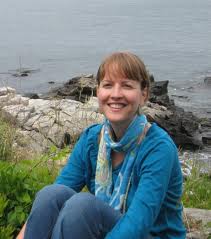 Becca J.R. Lachman lives with her husband Michael in Athens, Ohio, where she teaches, tutors, and writes. Her first book of poetry, The Apple Speaks, is dedicated “to humanitarian workers around the globe, but more for the families who love them.” She muses about the writing life and living simply at http://tattooedmennonite.blogspot.com/. This article was originally posted on the Femonite. A more detailed version of this post will appear as a chapter in the forthcoming anthology Mothering Mennonite (Demeter Press, April 2013).
Becca J.R. Lachman lives with her husband Michael in Athens, Ohio, where she teaches, tutors, and writes. Her first book of poetry, The Apple Speaks, is dedicated “to humanitarian workers around the globe, but more for the families who love them.” She muses about the writing life and living simply at http://tattooedmennonite.blogspot.com/. This article was originally posted on the Femonite. A more detailed version of this post will appear as a chapter in the forthcoming anthology Mothering Mennonite (Demeter Press, April 2013).
By Becca J.R. Lachman
Do me a favor: Imagine you’ve been asked to tell your mother’s life story. In public. In front of your family. Your community will be there–your ancestors, too. What stories would you choose to tell? And which influences, memories, or emotions might steer your tongue?
Being a creative writer, I often ask myself these same tough questions. Sorting through complex answers helps me to write what matters, what needs to be said simply because of beauty or music or truth (I make it sound rather easy here, but if you’re a writer, you know that it’s anything but.)
One writing exercise I return to involves imagining a long banquet table surrounded by the people or events that have shaped my sense of self and, most importantly, my public voice. Sometimes, the guests around this “inner writer’s table” surprise me with their presence: my 7-year-old-self, my high school boy friend, my strict great-great grandma I never met. Other times, they’re expected, even cliché: my seemingly perfect father, or my martyred religious ancestors with tongue screws still intact.
In order to write the truth (note: not necessarily the same thing as fact), I “excuse” certain guests from my inner table, then decide who sits at the head. This inner rearranging of place settings, if you will, can shape how–and why–my stories are told.
Over the past few months, I’ve been traveling to promote my first collection of poetry. But the real goal of this self-planned book tour is to encourage others (particularly women influenced by Mennonite Church USA) to realize the strength of their stories, and to share that truth–as Emily Dickinson puts it, to “tell it slant.” Having the courage to tell our version of a story, even our own, takes ongoing encouragement and hutzpah.
So wherever I go to share my own stories through poetry and song, I also offer free storytelling/poetry writing workshops for intergenerational women. I’m calling these gatherings “Creative (M)othering” workshops, not because I’m an expert on parenting (I don’t have children, may never have children) but because there are other, alternative ways of mothering, perhaps just as important to Anabaptist faith and culture and to new generations of feminists.
I believe that sharing our stories is a powerful form of creative mothering (what I define as the long-term act of affirming and mentoring one another’s originality and truth). As a writer, friend, wife, sister, daughter, and stumbling Anabaptist, it’s very important to me that mothering can also mean “to nurture, to author, or to protect” (dictionary.com). If I do have a child one day, I will teach him/her this with both my words and actions.
One reason I’ve been collecting stories is to nurture the Women in Leadership project within Mennonite Church USA. “Mennonite Monologues,” the project focus group I’m a part of, hopes to eventually collect diverse experiences for an anthology or worship resource. But at its most basic level, it simply asks Mennonite women of all ages to take the time to share their life experiences:
“Historically, women have often been silenced in a variety of ways, and we recognize that women’s stories are still sometimes silenced or devalued today. The Mennonite Monologues task force believes it is important for women in and connected to the church to share their stories, not only to value individual experience, but also to strengthen and transform communities. We might associate the word ‘monologue’ with a single actor on a stage, yet perhaps the most important aspect of a monologue is its chance to tell an uninterrupted story. Whatever your personal experience has been, we want to provide you with an open and sensitive space to share it.
The late writer Adrienne Rich maintained that ‘[women] have a profound stake, beyond the personal, in the project of describing our reality as candidly and fully as we can to each other.’ Believing in the power of story, Mennonite Monologues invites you to start recognizing and sharing the truth of your own experience.”
At a recent poetry reading in Orrville, Ohio, a confident 20-something man introduced himself to me as “a Mennonite feminist.” His public declaration made my entire week. (It also reminded me that men of all ages need opportunities to share their stories, too.)
“I will tell you something about stories,” writes novelist Leslie Marmon Silko. “They aren’t just entertainment. Don’t be fooled. They are all we have, you see, all we have to fight off illness and death.” As I’ve led Creative (M)othering workshops, I’ve been inspired, challenged, and changed by the stories shared and the questions raised. I’ve giggled and cried with strangers. I’ve found the community I’d always been hoping to find in Mennonite circles. And I’ve set new places at my “inner writer’s table.”
Please be in touch with me at ms.rossiter@gmail.com if you’re interested in having a Creative (M)othering workshop in your area! And stay tuned for more about the Mennonite Monologues project.

